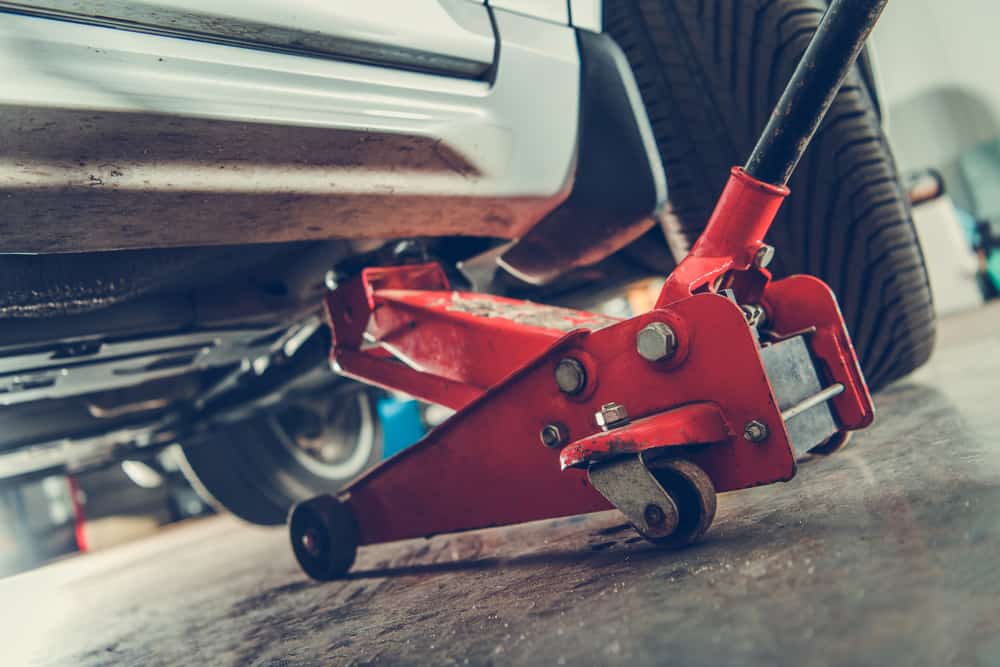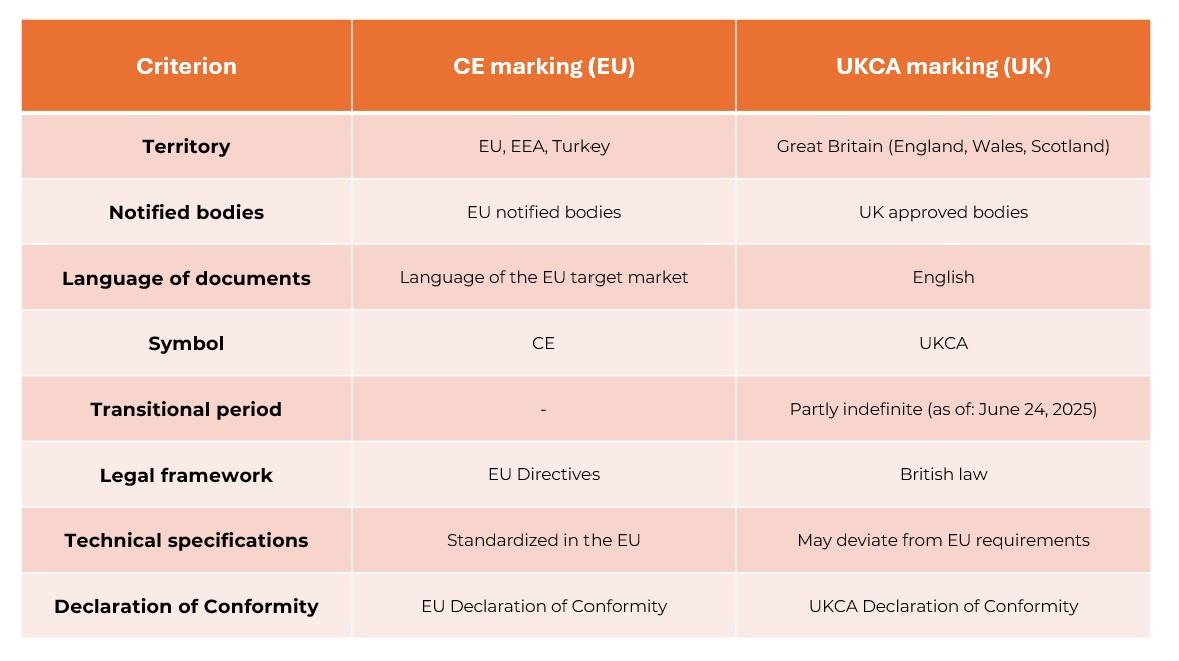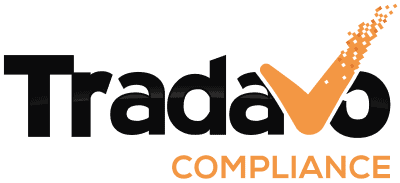UKCA marking vs. CE marking
Since Brexit, many companies know: If you want to sell to Great Britain, there is no way around the UKCA marking. But what does UKCA mean, anyway? Which products is the marking obligatory for? For what can you still use the CE marking? How do the requirements differ?
This blog post sheds light on the rather confusing issue of the UKCA and CE markings.
What is the UKCA marking?
UKCA stands for UK Conformity Assessed. Since Brexit, this marking replaced the previously used CE marking in Great Britain (England, Wales and Scotland). It certifies that the product complies with the statutory provisions in Britain.
It is the equivalent of the European CE marking, but with some small differences. UKCA has been in effect since January 1, 2021; however, special regulations and transitional periods that were rescheduled several times caused a lot of confusion with many businesses.
The UKCA marking does not apply in Northern Ireland; instead, the CE or UK(NI) marking apply, respectively.
You can find more information about the background of the CE marking, its origins and the principle of compliance in our blog post “CE Marking Part 1”.
For which products is the UKCA marking obligatory?
In principle, all products that were previously subject to the CE provisions are now subject to UKCA, i.e., regulated products such as:
- electronic devices and components
- machinery and mechanical systems
- personal protective equipment (PPE)
- toys
- construction products
- measuring instruments and scales
- medical devices
- pressure equipment
- gas appliances

The specific requirements vary depending on the type of product. Please note: In principle, if a product is subject to British law or intended to be sold there, UKCA applies, unless it is subject to one of the few exceptions (see next paragraph).
When are you or are you not allowed to use the CE marking?
Following Brexit, the British government repeatedly extended the transitional periods for the transition to UKCA, in some instances even indefinitely. Consequently, the following general rules apply:
Products may still be sold in Great Britain with the CE marking if:
- they have been certified based on EU regulations,
- there are no deviating requirements in Britain,
- a UK conformity assessment (e.g., by British notified bodies) is not required,
- and the conformity assessment is based of self-certification or certification by an EU notified body.
Products have to be equipped with a UKCA marking if:
- the British government issued deviating technical specifications or regulations,
- the product was assessed only by a British testing or certification body,
- or in the case of certain critical product groups (e.g., medical devices, certain construction products).
Simply put: The CE marking is valid in Great Britain only to a limited extent and under certain conditions. Many products will have to switch to UKCA in the long run.
For a more detailed comparison of the CE requirements in the EU, please see our blog post “CE Marking Part 2”.
What is the difference between CE and UKCA?

The procedure for the conformity assessment is different, too: While many manufacturers can fall back on existing EU certificates for the CE marking, UKCA may require new procedures, in particular if a British testing or certification body is needed.
Who is responsible for the UKCA marking?
Like with the CE marking, the responsibility lies with the manufacturer, the importer or the authorized representative, depending on where the product is placed on the market.
Please note:
- Manufacturers: have to ensure that their product meets the requirements, including preparation of the technical documentation and the declaration of conformity.
- Importers (established in the UK): are deemed to be distributors and are fully responsible for compliance.
- Authorized representatives: may be commissioned from outside of the UK, but usually have to be established in the United Kingdom; they assume certain tasks on behalf of the manufacturer.
Please note: Any EU manufacturer who ships directly to Great Britain without a local partner is automatically deemed to be a distributor – with all the legal consequences arising therefrom.
Practical examples: Which do I use when?
Example 1: Electrical kitchen appliance, self-certified
You are selling toasters on Amazon UK. The product is CE self-certified. You do not need a UKCA marking as long as the EU Directives remain unchanged and you can present the corresponding documents.
Example 2: Toy with notified body in the EU
Your toy was assessed by an EU notified body. It can still be sold in the UK with the CE marking.
Example 3: Medical device or construction product subject to British certification obligation
The UK requires specific certificates. In this case, UKCA is mandatory, a CE marking is not sufficient.
Documentation and product labeling requirements
For the UKCA marking, the following requirements have to be met:
- The UKCA marking has to be visible, legible, and permanently attached to the product, the nameplate or the packaging.
- A UKCA Declaration of Conformity has to be prepared and enclosed with the product.
- The complete technical documentation (in English) has to be presented upon request at any time.
- If a UK Approved Body is used, their ID number has to be indicated as well.
Note: Replacing the CE marking with the UKCA marking is not enough. A separate assessment process under British law is mandatory.
Exception: Northern Ireland
There are special provisions for Northern Ireland. There, the CE marking continues to be mandatory if EU regulations apply. Products assessed by a British body furthermore require the UKNI marking.
In short:

What does this mean for you as a seller?
The UKCA regulations give rise to a number of new questions for e-commerce and Amazon sellers in particular:
- Which marking do I need for my product?
- Which records do I have to keep?
- Who is responsible in case of direct shipment to the UK?
- How do I react to changes in standards and deadlines?
Early planning is the best strategy. Many sellers are already using a two-pronged approach: CE for the EU, UKCA for Great Britain, including specific documentation and labeling.
A short checklist for you:
- Check your product group and whether UKCA is mandatory.
- Continue to use CE whenever admissible, avoid double documentation.
- Prepare UK-specific documents (in English, compliant with British law) in due time.
- Clarify your role: Are you a manufacturer, an importer, or just a seller?
- Observe additional requirements on platforms such as Amazon UK (e.g., upload of the Declaration of Conformity)
Conclusion: The UKCA remains, but often, so does the CE marking
The good news is: The CE marking may still be used for many products. The bad news is: You need to check carefully which rules apply in your case.
If you are a seller or manufacturer selling to the UK, you should:
- carefully check your product category
- keep an eye on the applicable guidelines of the British government
- adapt your documents and product labeling as soon as possible
- Even though many transitional periods have been extended: sooner or later they will expire. Being prepared will help you save time and money and avoid legal risks.
We at Tradavo can help you
Do you need help with the implementation? Tradavo helps you prepare your business for the new statutory requirements. We will be happy to talk about your current situation and any way we can help you within the framework of a free initial consultation.
You need assistance?
Who wrote this article?
As an author, Christina fills the blog section of our website with exciting and informative articles, so that our readers can always take care of product compliance in their company in the most well-informed way.




